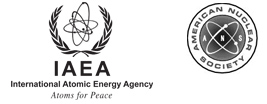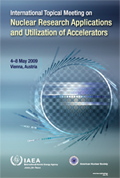- IAEA Meetings and Conferences
- Meetings in 2012
- Meetings in 2011
- Past Meetings:
- Meetings in 2010
- Meetings in 2009
- Meetings in 2008
- Meetings in 2007
- Meetings in 2006 Meetings in 2005 Meetings in 2004
- IAEA Meeting Schedule
- Search Meeting Announcements:
- Guide to the VIC:
General Information
Vienna Information
Vienna Sightseeing
Meetings in 2003
4-8 May 2009
Organized by the
In cooperation with the
ANNOUNCEMENT AND CALL FOR PAPERS
1. INTRODUCTION Applications of particle accelerators cover a number of areas, from strategic and applied research, safety and security, environmental applications, materials research and analytical sciences, to radioisotope production and radiation processing. Accelerator based techniques and pulsed neutron sources are expected to lead to new initiatives in materials research of relevance for both the nuclear and non-nuclear fields. Material science studies with the use of accelerators, neutron beams and other nuclear analytical methods are relevant to the development of advanced reactors, nuclear fuel cycle needs and fusion research. In this regard, a better understanding of the irradiation effects in materials for energy and non-energy applications is needed, and is reflected in accelerator techniques for modification and analysis of materials for nuclear technologies. Accelerator applications for innovative nuclear systems aiming at rad-waste transmutation (e.g., accelerator driven systems) are being pursued in many countries. Research and development using accelerators involves a broad spectrum of skills to build a cadre of trained experts in nuclear techniques in IAEA Member States, and to generate knowledge for innovative methodologies and tools. The present conference is also being held in cooperation with the American Nuclear Society (ANS), which successfully organized the series of accelerator applications conferences known as AccApp. The ANS series of topical meetings has provided a forum for the global exchange of scientific and technical knowledge on a wide variety of related topics since the first AccApp took place in 1997 in Albuquerque, USA. The last conference which was held in 2007 in Pocatello, USA, was jointly organized by the ANS and the IAEA. The main objectives of the conference are to promote exchange of information among IAEA Member States representatives/delegates and to discuss new trends in accelerator applications including nuclear materials research, accelerator driven systems and accelerator technology. It is also aimed at enhancing research collaboration between Member States and promoting education on topics related to the conference, emphasizing the potential of accelerator based technology for solving a wide variety of societal issues. The IAEA has previously held similar conferences in Sao Paulo, Brazil in 2001 and in 2005 in Dubrovnik, Croatia. The present conference is a further refined event in the series. 2. MAIN TOPICS Topics to be addressed at the conference:
Topics dealing with purely radioisotope production or clinical applications are not intended to be covered. 3. PROGRAMME STRUCTURE The conference programme will consist of an opening session, technical sessions with invited and contributed papers, several poster sessions and a closing session. There will also be a series of satellite meetings on specific topics. All oral contributions, except summaries, will be presented as posters. 4. PARTICIPATION The conference is dedicated to the worldwide accelerator and nuclear science communities, including operators, designers, users and technologists. Attendance by young professionals is strongly encouraged. Representation from the industrial sector will be sought. All persons wishing to participate in the conference are requested to register in advance online http://www-pub.iaea.org/MTCD/Meetings/Announcements.asp?ConfID=173. In addition, they must send a completed Participation Form (Form A) to the appropriate government authority for subsequent transmission to the IAEA. A Participant will be accepted only if FORM A is transmitted to the IAEA via one of the official channels (see Section 14). Participants applying from the American Nuclear Society can submit their forms directly to the IAEA. 5. CONTRIBUTED PAPERS AND POSTERS All papers – other than invited review papers – must present original work and must not have been published elsewhere. (a) Submission of abstracts Persons who wish to present a paper or poster at the conference must submit an abstract (in English) of 400 words maximum on one of the topics listed under Section 2. The abstract should be submitted through the IAEA’s web browser based, password protected file submission system — LISA ( http://www.iaea.org/cgi-bin/lisa-NRAU/start ). LISA will be operational from 6 October to 3 November 2008 for abstract submission. Instructions on using the LISA system are attached as an Annex, including a sample abstract. Further instructions on how to prepare and submit the abstract will be available on the LISA web site. An initial password, which can be obtained upon request (email:physics@iaea.org), is required to access the LISA system. A copy of the abstract should be submitted, together with the completed Form for Submission of a Paper (Form B) and the Participation Form (Form A), to the competent national authority (see Section 14) for official transmission to the IAEA. The deadline for receipt by the IAEA is 3 November 2008. The abstract should give enough information on the contents of the proposed paper to enable the Programme Committee to evaluate it. Introductory and general matters should not be included. The abstract will be considered by the Programme Committee only if the Participation Form A and Paper Submission Form B have been received by the IAEA via the official channels. (b) Acceptance of Papers for Oral Presentation and Poster Presentation In order to provide ample time for discussion, the number of papers that can be accepted for oral presentation is limited. If the number of relevant and high quality papers submitted for selection exceeds the acceptable number, some of them will be selected for poster presentation. Authors will be informed by 20 December 2008 whether their paper has been accepted by the Programme Committee on the basis of the abstract submitted. At the same time authors will be advised if their paper has been accepted for oral presentation or for presentation as a poster. Furthermore, those authors who are asked to prepare full papers for publication in the proceedings will receive guidelines for their preparation. However, all of the accepted abstracts will be reproduced in unedited form in the Book of Abstracts which will be distributed at registration. 6. EXPENDITURES The cost of the organization of the conference is borne by the IAEA. No registration fee is charged to participants. As a general rule, the IAEA does not pay the cost of attendance, i.e. travel and living expenses, of participants. However, limited funds are available to help meet the cost of attendance of selected specialists, mainly from developing countries with limited economic resources. Generally, not more than one travel grant may be awarded to any one country. To apply for a travel grant, please complete and send the Grant Application Form C through your appropriate government authority (see section 14) together with the Participation Form A, and the Paper Submission Form B and other relevant material. All forms must reach the IAEA by 3 November 2008 at the latest. Travel grant requests will only be considered for authors of accepted papers. Incomplete or late applications will not be considered. The grants will be lump sums usually covering only part of the cost of attendance. 7. KEY DEADLINES Submission of abstract (400 words): 6 October – 3 November 2008 (LISA System), 8. PROCEEDINGS It is intended that the proceedings of the conference will be published in the IAEA Proceedings Series. 9. DISTRIBUTION OF DOCUMENTATION A preliminary programme of the conference will be sent to participants in advance. The final programme and the book of abstracts will be distributed at registration. 10. EXHIBITIONS A limited amount of space will be available for commercial vendors’ displays/exhibits during the conference. Interested parties should contact the scientific secretariat (Ms F. Mulhauser) by email: F.Muelhauser@iaea.org as soon as possible. 11. WORKING LANGUAGE The working language of the conference will be English. All communications, abstracts and papers must, therefore, be sent to the IAEA in English. 12. ACCOMMODATION Detailed information on accommodation and other conference related information will be sent to all designated participants well in advance of the conference. This information will also be available on the conference web site. 13. VISA Designated participants who require a visa to enter Austria (Schengen State) should submit the necessary applications to the nearest diplomatic or consular representative of Austria or any other consular authority of a Schengen partner State representing Austria as early as possible (please note that it could take up to three weeks to obtain a visa). 14. CHANNELS OF COMMUNICATION The Participation Form and, as applicable, the Form for Submission of a Paper/Poster and the Grant Application Form, should be sent to the competent national authority (Ministry of Foreign Affairs, National Atomic Energy Authority) for official transmission to the IAEA. Participants applying from the American Nuclear Society can submit their forms directly to the IAEA. 15. SECRETARIAT International Atomic Energy Agency Scientific Secretaries of the Conference: Mr Guenter Mank Mr Victor Inozemtsev (Applications, Materials) Ms Françoise Mulhauser (Technology, Satellite Meetings and Exhibitions) Mr Alexander Stanculescu (ADS) Administration and Organization: Mr. Tom Alexander Subsequent correspondence on scientific matters should be sent to the appropriate Scientific Secretary and correspondence on administrative matters to the IAEA Conference Services Section. 16. CONFERENCE WEB PAGE Please visit the IAEA conference web page regularly for new information regarding this conference:
|


